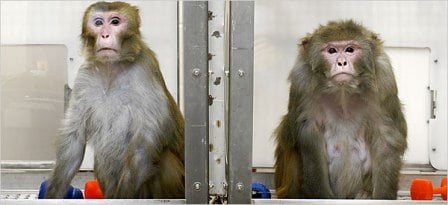Misery for Monkeys in Wisconsin Laboratory
The year was 1989. Grandpa Bush moved into the White House. Actor/dolphin protector Hayden Panettiere was born. And most Americans had never even heard of the Internet.
That same year, experiments were initiated at the University of Wisconsin in which rhesus monkeys were crammed into tiny, barren metal cages, slated to spend their entire lives as experiments in order to study the effects of diet on aging.
Fast-forward to 2009: These highly social animals are still isolated in cages—they’ve been there for two decades. One half of the population of 76 monkeys has been deliberately underfed for the past 20 years. All of them have been unable to take more than a step or two in any direction since arriving at the University of Wisconsin-Madison, and—if researchers have their way—all these monkeys will continue to suffer until they die, which could take another 15 years.

The results of this experiment: After years of starvation, the “calorie-restricted” animals looked “less wrinkled and flabby.”
The senior author of this grossly inhumane study, University of Wisconsin-Madison’s Richard Weindruch, is blatantly ignoring the positive effects of exercise on the human heart, bone health, and body weight. And dozens of highly social, active animals have been condemned to a lifetime of isolation, without even the simplest yet meaningful benefit of cagemates, because of it. So, we’ve filed a complaint with the Institutional Animal Care and Use Committee (IACUC) and the U.S. Department of Agriculture stating that the positive health effects of caloric restriction have already been confirmed in short-term human trials and that the suffering endured by these monkeys is not justified by the perceived benefit of the experiment.
Written by Karin Bennett
